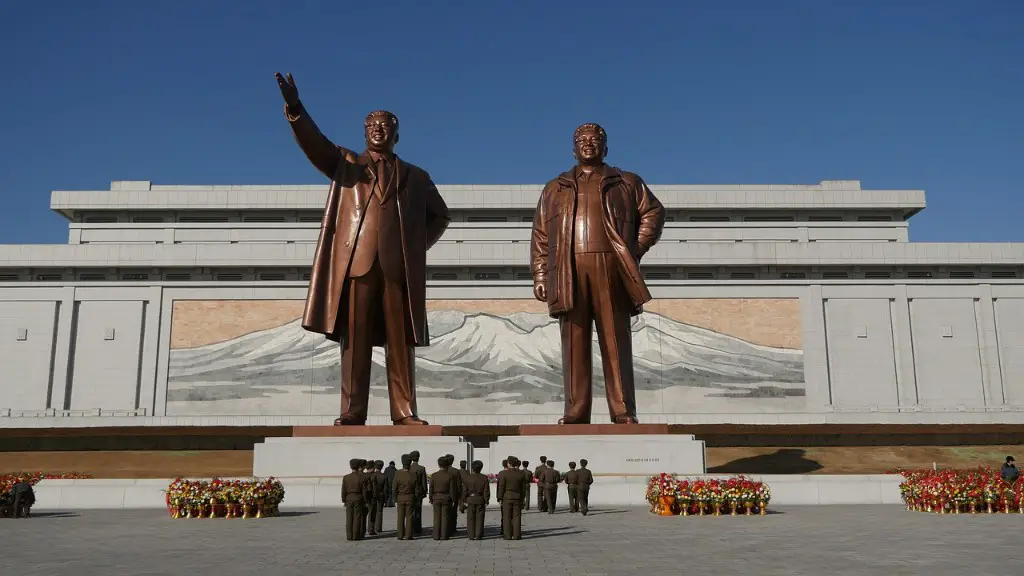Causes Of Starvation In North Korea
The percentage of North Korea starving is estimated to be significantly high. While there are no exact figures available, it is thought to be one of the highest in the world, with UN estimates citing a rate of over 10 percent in 2017. To understand the situation in North Korea, it is important to look at the causes of this widespread hunger.
One way to link the issue of starvation with North Korea is to look at the country’s economic conditions. After decades of economic mismanagement by its totalitarian government, the country is now subject to one of the most oppressive forms of poverty in the world. Sanctions imposed on the country by the United Nations since it conducted nuclear tests in 2006 have been a major contributor to North Korea’s economic woes, choking off international funding and investment. This has reduced the amount of money North Korea has available to reconstruct its crumbling infrastructure and to produce food, resulting in a significant decrease in the amount of food available to the population, leading to food insecurity.
The state of North Korea’s agricultural sector is another contributing factor. The lack of necessary fertilizer, pesticides, and other agro-inputs has led to a sharp decrease in agricultural output, while deforestation has damaged soil quality and reduced the area available for agriculture. With inadequate infrastructure, poor soil quality, and no access to modern agricultural technologies, the country has been unable to effectively address its food shortages, leading to a further depletion of already limited natural resources.
A further issue contributing to the starvation in North Korea is its lack of organizational infrastructure. Poorly organized local and regional food distribution networks are inadequate and inefficient, leading to food coming increasingly unavailable to the hungry. Moreover, the government’s focus on military spending and its lack of concern for improving the lives of the population further exacerbate the situation.
North Korea:Economic Hardship
The economic hardship in North Korea has been a significant contributing factor to the level of starvation seen in the country. One of the main causes of this is the chronic mismanagement of finances by the state. Since the early 1990s, the central government has exerted oppressive and coercive control over the economy. This has limited investment in the country, and led to a collapse in economic production. This in turn has led to severe economic stagnation and an exceptionally high level of poverty, with reports suggesting that over one-third of the population live in absolute poverty.
Furthermore, North Korea’s economy is heavily reliant on foreign aid. Two decades of mismanagement and authoritarian rule have caused the level of production in North Korea to decrease significantly. This, coupled with the crippling sanctions imposed on the country since it conducted nuclear tests in 2006, has severely diminished international investor confidence, resulting in significantly reduced foreign aid. This has caused further stunting of economic growth and the flow of resources, leading to even fewer resources and food available for distribution among the population.
In addition, the North Korean government has all but completely monopolized the country’s economy, leading to an absence of economic freedom. The lack of freedom to pursue economic activities has severely limited the people’s ability to find alternatives to the state-mandated systems of providing food and services, leading to a lack of initiative and initiative to increase production in the agricultural sector. As a result, the level of starvation in North Korea has steadily risen.
Prolonged Famine in North Korea
One of the longest and most severe famines in modern history has been occurring in North Korea. The 1990s saw the nation go through a period of intense economic crisis and famine, with many reports of massive amounts of people dying from malnutrition and starvation. The famine was caused by a combination of factors, including the shutting down of aid from both former Soviet Union and of other countries, as well as a devastating combination of floods and droughts in the country. In addition, the lack of economic reforms implemented by the government and its high levels of spending on the military are also amongst the factors that contributed to the prolonged famine.
The famine was further intensified by the North Korean government’s restrictive access to assistance programs. Information about the effects of the famine on the country was largely suppressed or ignored by the authorities, and no relief efforts were made to curb the suffering of the population. This, coupled with the lack of access to international aid, meant that the population had to rely on themselves to somehow survive.
The economic and humanitarian fallout of the famine was immense. Millions of people were reported to have died and a significant proportion of the population was left malnourished and undernourished — a blow to the country’s already weakened agricultural sector. In addition, a range of diseases such as tuberculosis, beriberi, and anemia spread and caused further death, with estimates suggesting that over three million North Koreans lost their lives as a result.
North Korean Food Crisis: An Ongoing Struggle
The food crisis in North Korea is an ongoing struggle for the people of the country. Despite recent improvements in the provision of nutrition and other services, the country still remains food insecure, with widespread starvation and malnutrition still present. The UN World Food Programme (WFP) estimates that over four million people in the country are still in need of food assistance.
This dire situation has been attributed largely to trade sanctions and other external pressures, as well as a lack of resources, infrastructure and a weak economy. With a fragile political and economic climate, it is difficult to implement necessary economic reforms and to provide sufficient food, nutrition and other services to the population. In addition, the country has been facing increasing levels of environmental degradation, with areas such as deforestation and soil erosion exacerbating the already dire situation.
The high levels of starvation in North Korea may seem like an insurmountable challenge, but there are still several ways to help. For one, food aid is still very much needed in the country. In addition, non-profit organizations such as the WFP provide financial assistance and nutritional support to those in need in North Korea. Further, increasing international awareness and cooperation with the North Korean government to improve the country’s economic, social, and political stability would go a long way in reducing the hunger and poverty seen in the nation.
The Psychological Impact Of Starvation
The psychological effects of North Korea’s starvation must not be overlooked. The physical impacts of malnutrition and hunger often come paired with devastating long-term mental effects. Studies of those who have experienced long-term starvation show the effects of chronic malnutrition on an individual’s psychological health. Experiencing hunger has been linked to increased levels of anxiety, depression, and suicidal ideation.
It has been reported that food shortages can trigger feelings of guilt, shame, and feelings of helplessness and hopelessness in affected individuals. Children also seem to be particularly affected, with evidence suggesting they were more likely to develop delinquent behavior as a result of their hunger. Both directly and indirectly, the widespread hunger in North Korea has a long-term psychological impact on its victims.
It has been suggested that the lack of food in North Korea has also had a negative effect on its education system. Having to compete for scarce resources has been proven to affect school attendance, with children often forced to stay home to look after younger siblings or to search for food instead. This has led to a decrease in educational attainment, with many children lacking the necessary skills and knowledge to be successful in the future.
Raising Awareness Of The Hunger Crisis
In recent years, there has been an increasing focus on the plight of North Korea’s starving population. International bodies such as the UN and individual countries have been making efforts to raise awareness of the issue and to encourage donations and other forms of assistance. This has also seen increased pressure on the North Korean government to institute reforms which would improve the country’s economic and political climate.
Despite the increased media coverage, there is still a need for more to be done to tackle the crisis. There are several key steps which can be taken to improve the situation further. First, the international community must continue to pressure the North Korean government to allow for greater freedom of access for aid organizations to ensure resources are delivered to those who need it most. Second, more must be done to improve the North Korean agricultural sector, providing necessary agricultural inputs along with modern agricultural technologies and infrastructure. Finally, efforts must be made to provide educational opportunities to the population to help reduce the country’s endemic levels of poverty.
The Future Of North Korea
Despite the ongoing hunger crisis, there is hope for the future of North Korea. Hopefully, with increased international involvement and awareness, the country can transition towards a more stable and prosperous future. Improved education, resources and infrastructure would go a long way in reducing the level of starvation and creating an environment where the population can thrive.
To this end, the international community must remain committed to supporting the people of North Korea. The continued provision of humanitarian aid and other resources must be complemented by the North Korean government’s efforts in reform and sustainability, in order to bring about lasting change. In addition, long-term aid and financial assistance must be provided in order for North Korea to get back on its feet and for the level of hunger in the country to be reduced.
As for the North Korean people, there is a need for resilience and determination. Despite the hardship of their circumstances, there are individuals and organizations in North Korea which are taking the initiative to help alleviate the suffering of the needy and to empower the population. This determined spirit can be a driving force for the future of the country — and hopefully inspire more people to take action to help a population in desperate need.

